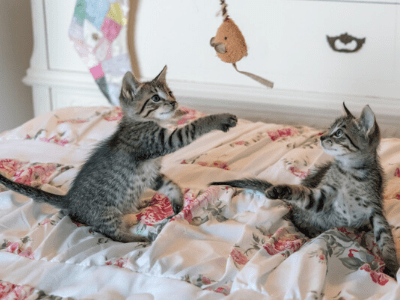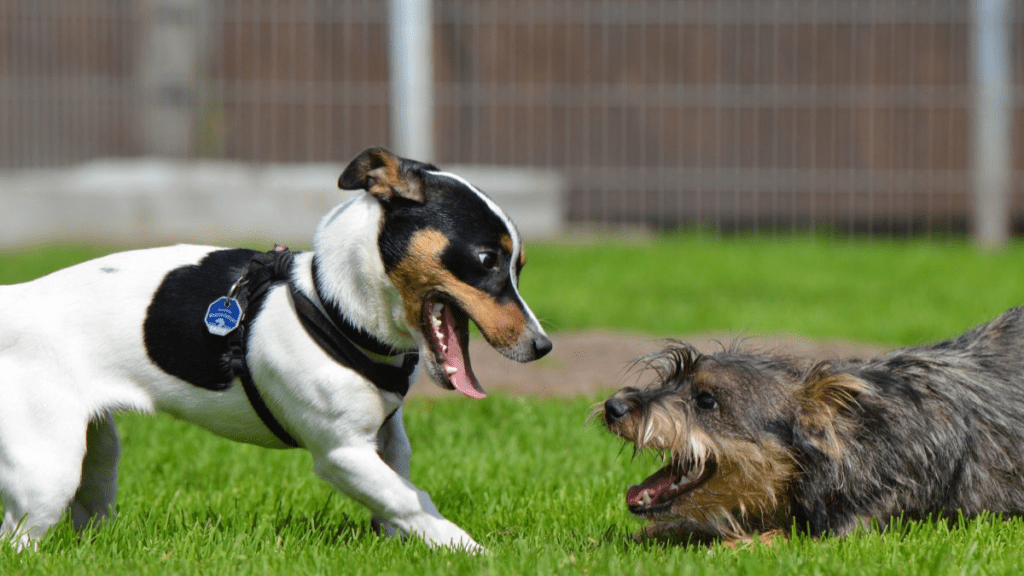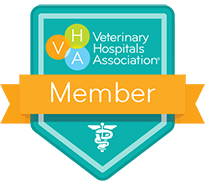All animals require socialization to some extent, especially young and active canines. Socializing your dog or cat takes time, patience and lots of repetition. These days, it’s even harder to socialize a pet as we all practice social distancing. Today is the fourth day of National Pet Week, and we’d like to give you some pointers on how to property socialize your dog or cat and still stay safe in the year of the coronavirus pandemic.
Let’s start out by explaining what socialization means and why it’s important. Socialization is the act of preparing your dog or cat to enjoy interacting with other animals and people and teaching them to be comfortable with new places and activities. Pets tend to do best if they are socialized beginning at a very young age (less than 14 weeks for puppies and under 9 weeks for kittens), but socialization can be successful at any stage in an animal’s life. As pets mature, they tend to be more nervous during new experiences, so it’s important to expose them to as many places, people, animals and activities as possible while they’re still young and fearless. Pets who are socialized tend to more friendly, calm and affectionate and less anxious, aggressive or nervous.
Socializing can actually be quite fun for you and your pet! It requires that you expose your pet to various animals (like other pets/playmates), people, environments, activities and objects. Some examples include:
Let’s start out by explaining what socialization means and why it’s important. Socialization is the act of preparing your dog or cat to enjoy interacting with other animals and people and teaching them to be comfortable with new places and activities. Pets tend to do best if they are socialized beginning at a very young age (less than 14 weeks for puppies and under 9 weeks for kittens), but socialization can be successful at any stage in an animal’s life. As pets mature, they tend to be more nervous during new experiences, so it’s important to expose them to as many places, people, animals and activities as possible while they’re still young and fearless. Pets who are socialized tend to more friendly, calm and affectionate and less anxious, aggressive or nervous.
Socializing can actually be quite fun for you and your pet! It requires that you expose your pet to various animals (like other pets/playmates), people, environments, activities and objects. Some examples include:
- planning a play date with another pup or kitten
- going for a walk in a new area
- bringing your kitten to a family member's home to hang out for the evening
- trading your dog's favorite chew toy for a new rope toy
- exchanging your cat's preferred feather duster for a laser toy
- bringing your dog for a drive
- trying out a new scratching post or pet bed
Positive and diverse experiences that occur regularly are key to socializing your pet without promoting fear or aggression. Socialization classes for puppies and kittens are great ways to provide consistent opportunities for socialization.
You can encourage your pets to engage in socializing activities by praising and rewarding them for their participation. If your pet acts uncomfortable, don’t push things along too quickly.
Some reminders:
You can encourage your pets to engage in socializing activities by praising and rewarding them for their participation. If your pet acts uncomfortable, don’t push things along too quickly.
Some reminders:
- Do not expose your pets to other animals or outdoor areas unless they are fully vaccinated, have a negative fecal test, and are protected from heartworm, fleas and ticks. This is for your own pet’s safety, as well as for that of other pets. Ask your veterinarian if you have any questions or concerns about these preventative measures.
- Some dogs and cats have special behavior needs that make socialization extremely challenging for their owners. In these scenarios, it’s usually best to develop a socialization plan with your veterinarian, possibly in conjunction with an animal behaviorist.

There’s no doubt that the coronavirus pandemic has made it much more difficult to socialize our pets. You may be wondering if you should just wait to socialize your pet (or discontinue routine socializing opportunities) until all of this has blown over. We have some good news: there are ways to socialize while still following recent CDC guidelines.
The easiest and most effective action you can take right now is to go on lots of walks. While your pups may not be able to sniff and play with other animals, they will still be exposed to new scents, sights and sounds in their environment. Add variety by choosing different routes each week; walk through a quiet nature reserve one day, and a bustling downtown the next. Make sure you bring along treats and reward your pets as they encounter new things, so that they learn to enjoy different experiences.
Try not to pull at your dog’s leash whenever you encounter other people or animals. It’s highly likely that your pet will want to greet others, but close interactions between humans are not considered safe at this time. Unfortunately, consistently preventing your pet from interacting with other people and animals could teach him to fear others, and it will most definitely frustrate him. Do your best to anticipate when others will be approaching so that you can distract him with treats or toys while they pass. Under normal circumstances, your dog may be allowed to greet others in close proximity but this unusual time calls for changes in typical guidelines. By distracting your pet before he realizes that others are approaching, you will teach him to pay attention to you while still realizing that there’s nothing to fear from other animals and people.
When you get home from your walks, make sure to wash your hands. This is especially important if your pet did interact with other humans or animals. Clean your puppy’s collar and leash if another pet or person touched them. It may be easiest to have a second collar (with ID tags) and leash on-hand so that you can alternate.
Try to organize pet play dates with others who you know haven’t been sick and have been following CDC guidelines. It’s very important that your pets have contact with other animals of the same species. Alternate locations to also provide different environmental exposures. Make sure to arrange safe pick-up and drop-off procedures that practice social distancing. Make sure all playdates are in private, secured locations like a fenced yard. Don’t allow playdates with pets who are not up-to-date on vaccines (primarily distemper, parvovirus and Bordetella), heartworm and flea/tick preventatives, and annual fecal testing. Limit playdates to pets from only one other household at a time. If the playdate is scheduled to be in your home, practice frequent hand washing.
The easiest and most effective action you can take right now is to go on lots of walks. While your pups may not be able to sniff and play with other animals, they will still be exposed to new scents, sights and sounds in their environment. Add variety by choosing different routes each week; walk through a quiet nature reserve one day, and a bustling downtown the next. Make sure you bring along treats and reward your pets as they encounter new things, so that they learn to enjoy different experiences.
Try not to pull at your dog’s leash whenever you encounter other people or animals. It’s highly likely that your pet will want to greet others, but close interactions between humans are not considered safe at this time. Unfortunately, consistently preventing your pet from interacting with other people and animals could teach him to fear others, and it will most definitely frustrate him. Do your best to anticipate when others will be approaching so that you can distract him with treats or toys while they pass. Under normal circumstances, your dog may be allowed to greet others in close proximity but this unusual time calls for changes in typical guidelines. By distracting your pet before he realizes that others are approaching, you will teach him to pay attention to you while still realizing that there’s nothing to fear from other animals and people.
When you get home from your walks, make sure to wash your hands. This is especially important if your pet did interact with other humans or animals. Clean your puppy’s collar and leash if another pet or person touched them. It may be easiest to have a second collar (with ID tags) and leash on-hand so that you can alternate.
Try to organize pet play dates with others who you know haven’t been sick and have been following CDC guidelines. It’s very important that your pets have contact with other animals of the same species. Alternate locations to also provide different environmental exposures. Make sure to arrange safe pick-up and drop-off procedures that practice social distancing. Make sure all playdates are in private, secured locations like a fenced yard. Don’t allow playdates with pets who are not up-to-date on vaccines (primarily distemper, parvovirus and Bordetella), heartworm and flea/tick preventatives, and annual fecal testing. Limit playdates to pets from only one other household at a time. If the playdate is scheduled to be in your home, practice frequent hand washing.
As you can see, there are many ways to socialize your pet, even while the world is fighting off a viral pandemic. Things will certainly be easier for pet owners when COVID-19 is just a thing of the past, but for now we need to be vigilant about protecting ourselves and our pets while still keeping our pets active and engaged.






